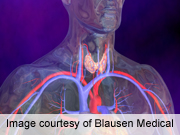- 8 Ways to Increase Dopamine Naturally
- 7 Best Breads for Maintaining Stable Blood Sugar
- Gelatin vs. Collagen: Which is Best for Skin, Nails, and Joints?
- The Long-Term Effects of Daily Turmeric Supplements on Liver Health
- Could Your Grocery Store Meat Be Causing Recurring UTIs?
- Are You Making This Expensive Thermostat Error This Winter?
- Recognizing the Signs of Hypothyroidism
- 10 Strategies to Overcome Insomnia
- Could Artificial Sweeteners Be Aging the Brain Faster?
- Techniques for Soothing Your Nervous System
Underactive Thyroid Not Linked to Memory Problems


Hypothyroidism, a condition that causes low or no thyroid hormone production, is not linked to mild dementia or impaired brain function, a new study suggests.
Although more research is needed, the scientists said their findings add to mounting evidence that the thyroid gland disorder is not tied to the memory and thinking problems known as “mild cognitive impairment.”
Some prior evidence has suggested that changes in the body’s endocrine system, including thyroid function, might be linked to Alzheimer’s disease and other forms of dementia, said researchers led by Dr. Ajay Parsaik, of the University of Texas Medical School in Houston.
Mild cognitive impairment, in particular, is thought to be an early warning sign of the memory-robbing disorder Alzheimer’s disease, the study authors said in a university news release.
In conducting the study, Parsaik’s team examined a group of more than 1,900 people, including those with mild and more severe cases of hypothyroidism. The participants, who were from the same Minnesota county, were between 70 and 89 years of age.
The study showed that memory and thinking problems occurred at about the same rate regardless of thyroid function. Impairments in brain function occurred in 16 percent of participants with normal thyroid function, 17 percent of patients with more severe hypothyroidism and 18 percent of people with mild hypothyroidism.
No association between hypothyroidism and mild brain impairment was found, the researchers said, even after they took into account the participants’ age, gender, body-mass index (a measurement of body fat based on height and weight) and other health problems.
One expert said the final word on this issue might still be yet to come, however.
Dr. Spyros Mezitis, an endocrinologist at Lenox Hill Hospital in New York City, said the study had a “robust” design. But because the results conflict with those of prior studies, they “need to be validated in research in separate settings” and with a trial that follows patients over time.
“The practicing physician should continue testing thyroid function in the setting of [memory and thinking] decline and treating clinical hypothyroidism,” Mezitis said.
The study was published online Dec. 30 in the journal JAMA Neurology.
More information
The U.S. National Institute of Diabetes and Digestive and Kidney Diseases has more about hypothyroidism.
Source: HealthDay
Copyright © 2026 HealthDay. All rights reserved.










